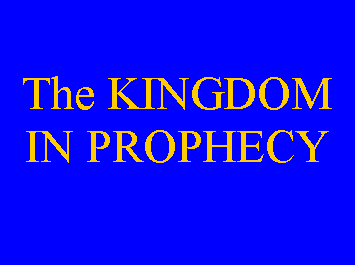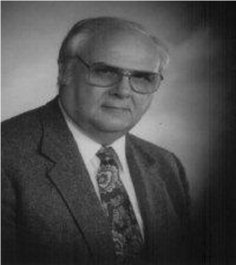

|
At the trial of Jesus the Gospels all record that kingdom is not of this world — if it were, my important statement, for if Jesus had ever offered the Jewish nation an earthly, political restoration of the land to Israel and an earthly kingdom (as many claim), then the court testimony of Jesus would have been perjury. If the promises of God demanded an earthly literal fulfillment, then Jesus could not have been the Messiah unless He fulfilled them.
The evidence of the Scripture is that Jesus carried our God’s plan to the letter, not in a literal fashion, but in the realm of the Spirit. Paul said, “Jesus Christ was a minister of the circumcision . . . to confirm the promises made unto the fathers,” Rom. 15:8. He did not say that Christ will confirm the promises at His Second Coming, but that He has confirmed them. In all of the New Testament Scriptures teaching concerning the Kingdom, the tense used is the present. The Kingdom is now, not some time in the future.
For 400 years there had been no word from the Lord. After the stream of Old Testament prophecy had ended with Malachi, there was silence. Suddenly, out of the stillness came one clothed in leather and camel’s hair, eating locust and wild honey, who proclaimed, “Prepare ye the way of the Lord, make his paths straight” (Matt. 3:3; Mk. 1:3; Luke 3:4). This was the fulfillment of Isaiah’s prophecy in Is. 40:3.
It is significant that the first human lips that were opened to prophesy the beginning of a new and long-awaited era, fell from the lips of two women — Elizabeth and Mary (Luke 1:41-55). They had received their information from the angel Gabriel. The words uttered by Mary tell clearly that the new era was not to be characterized as an earthly kingdom. It was to be characterized by “the mercy” (Micah 7:20) promised to the fathers, “to Abraham and his seed.” Abraham’s seed, according to Gal. 3:16, is Jesus Christ. Paul says that “the seed of Abraham” who were to inherit the promises are those who believe the gospel, Gal. 3:7. For as many of you as have been baptized into Christ have put on Christ. There is neither Jew nor Greek, there is neither bond nor free, there is neither male nor female: for ye are all one in Christ Jesus. And if ye be Christ's, then are ye Abraham's seed, and heirs according to the promise” (Gal. 3:27-29).
From these Scriptures we may briefly summarize the various predictions concerning the Seed of David by saying that what God promised to give through David’s line was not an earthly King for the Jews, but a Savior for all the world. Zecharias, father of John the Baptist, prophesied of the coming One as a Savior, saying, “Blessed be the Lord God of Israel; for he hath visited and redeemed his people, And hath raised up an horn of salvation for us in the house of his servant David; As he spake by the mouth of his holy prophets, which have been since the world began” (Luke1:68-70). So, we learn that what was required to fulfill what all the prophets foretold was the coming in the House of David, not of an earthly king, but of a Savior!
Matthew 4:14-16 is a quotation from Isaiah 9:1, and is said to be fulfillment of that prophecy: “That it might be fulfilled which was spoken by Esaias the prophet, saying, The land of Zabulon, and the land of Nephthalim, by the way of the sea, beyond Jordan, Galilee of the Gentiles; The people which sat in darkness saw great light; and to them which sat in the region and shadow of death light is sprung up.”
These two prophecies cited at the very beginning of the Gospel of Matthew — one at His birth and the other at the commencement of His ministry — have nothing whatsoever to do with an earthly kingdom and everything to do with the salvation of the whole world.
Since Jesus did not come to be an earthly king, it is only reasonable to recognize that He did not spend His life and ministry trying to establish an earthly kingdom. So far from anything like the Jewish expectations coming to pass, that which did happen was the complete destruction, temple, and nation, and their scattering throughout the world — even to this day. Every vestige of their national identity was erased.
It is clear, then, that the “kingdom of Heaven,” which formed the content of our Lord’s teaching, and the earthly kingdom for which the Jews (as well as our dispensational brothers today), were (and still are) looking are not the same kingdom. They are completely different the one from the other. With this understanding, it is easy to discern many details of prophecy which are fulfilled in this present age.
Isaiah 11:10 is especially significant: And in that day there shall be a root of Jesse, which shall stand for an ensign of the people; to it shall the Gentiles seek: and his rest shall be glorious.” Paul quotes this in Rom. 15:12 and applies it to New Testament salvation which is available to all — Jew and Gentile alike — when he reworded it this way, “Esaias saith, There shall be a root of Jesse, and he that shall rise to reign over the Gentiles; in him shall trust.”
Psalm 2 is a great prophecy distinguished by calling God’s Christ, “My Anointed” and “My Son,” and designating Him His King. The subject of an earthly kingdom is conspicuous by its absence. The first part of this Psalm, speaking of the opposition of earthly rulers and peoples, finds fulfillment in the crucifixion of Jesus Christ (Acts 4:24-28). The words, “Thou are my son” were spoken by the Father at the Lord’s baptism, where His death and resurrection were prefigured, and where He received the anointing of the Holy Spirit for His ministry (Matt. 3:17; 17:5; Acts 13:33). The Acts passage indicates this Psalm was a prophecy to be fulfilled in the resurrection of Christ, not in the establishment of an earthly kingdom. The last verse of this wonderful prophecy is an unmistakable gospel promise: Blessed are all they that put their trust in him.”
The Second Coming is the time of Judgment, which Christ likened to a boat catching all kinds of fish, both good and bad. They are sorted and dealt with accordingly, and no mention is made of a millennium, but the promise of eternity in heaven is there. Let us proclaim the precious truth that all prophecy focuses on Him! Generically, “Israel” is Christ, the promised seed, and the church is the body of Christ and the Kingdom over which He reigns. Rev. 5:9-10, “And they sung a new song, saying, Thou art worthy to take the book and to open the seals thereof for thou wast slain, and hast redeemed us to God by thy blood out of every kindred, and tongue, and people, and nation; And hast made us unto our God kings and priests: and we shall reign on the earth.”
The great goal of redemption history is a people, one people, “in Him” and “for Him,” here and now “blessed with all spiritual blessings in Christ.” The incomparable Person and work of Christ is the real fulfillment of all prophecy. We are not expecting a kingdom to come, but the King!
17 This article originally appeared in Reformation Witness April 2001..
|
